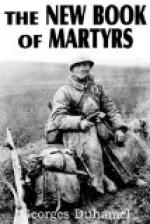If I come into the ward, Mathouillet’s smile awaits and welcomes me. When the dressing is over, Mathouillet thanks me with a smile. If I look at the temperature chart, Mathouillet’s smile follows me, but not questioningly; Mathouillet has faith in me, but his smile says a number of unspoken things that I understand perfectly. Conversation is difficult, on account of this unfortunate deafness—that is to say, conversation as usually carried on. But we two, happily, have no need of words. For some time past, certain smiles have been enough for us. And Mathouillet smiles, not only with his eyes or with his lips, but with his nose, his beardless chin, his broad, smooth forehead, crowned by the pale hair of the North, with all his gentle, boyish face.
Now that Mathouillet can get up, he eats at the table, with his comrades. To call him to meals, Baraffe utters a piercing cry, which reaches the ear of the bombardier-grenadier.
He arrives, shuffling his slippers along the floor, and examines all the laughing faces. As he cannot hear, he hesitates to sit down, and this time his smile betrays embarrassment and confusion.
Coming very close to him, I say loudly:
“Your comrades are calling you to dinner, my boy.”
“Yes, yes,” he replies, “but because they know I am deaf, they sometimes try to play tricks on me.”
His cheeks flush warmly as he makes this impromptu confidence. Then he makes up his mind to sit down, after interrogating me with his most affectionate smile.
X
Once upon a time, Paga would have been called un type; now he is un numero. This means that he is an original, that his ways of considering and practising life are unusual; and as life here is reduced entirely to terms of suffering, it means that his manner of suffering differs from that of other people.
From the very beginning, during those hard moments when the wounded man lies plunged in stupor and self-forgetfulness, Paga distinguished himself by some remarkable eccentricities.
Left leg broken, right foot injured, such was the report on Paga’s hospital sheet.
Now the leg was not doing at all well. Every morning, the good head doctor stared at the swollen flesh with his little round discoloured eyes and said: “Come, we must just wait till to-morrow.” But Paga did not want to wait.
Flushed with fever, his hands trembling, his southern accent exaggerated by approaching delirium, he said, as soon as we came to see him.
“My wish, my wish! You know my wish, doctor.”
Then, lower, with a kind of passion:
“I want you to cut it off, you know. I want you to cut this leg. Oh! I shan’t be happy till it is done. Doctor, cut it, cut it off.”
We didn’t cut it at all, and Paga’s business was very successfully arranged. I even feel sure that this leg became quite a respectable limb again.




